There are lots of homemade bug sprays and remedies that work great to kill pests on indoor plants. So skip the toxic chemical insecticides, and try these methods instead.
In this post I’ll give you 9 of my go-to recipes and home remedies that are gentle enough to use on your houseplants.
This list includes my favorite DIY plant-safe bug sprays, as well as all-natural pesticides, and insect repellents for your indoor plants.
Why Use Natural Pesticides For Indoor Plants?
The obvious reason to use natural insecticides on indoor plants, rather than synthetic chemicals, is because they are much safer for us. But here are a few other benefits:
- Chemical pesticides are expensive to buy, and making your own is usually much cheaper.
- Homemade remedies work better, because many houseplant pests are resistant, or can quickly build up resistance, to chemicals.
- You have complete control of the ingredients, so you can make sure that the ones you use are safe and non-toxic to your family and your pets.
Choosing The Best Home Remedies To Use
To get the most effective and fastest results using homemade pesticides, there are a few things to keep in mind:
- You should know which type of houseplant bug you’re dealing with so you can choose the best method to use against it.
- There’s not a one-size-fits-all solution, so you should experiment with using a few of these methods together to find what works the best for you.
- Whatever solution you choose to use, you must be persistent with it. You can’t get rid of houseplant bugs with only one or two treatments. It can take some time.
Homemade Bug Sprays For Indoor Plants
Before we get into the DIY bug spray recipes, I wanted to give you a few quick tips for how to properly use them on your indoor plants, and also some general precautions:
- Always test any type of spray first – Some houseplants are sensitive to bug sprays, even homemade ones. So you should always test it on a few leaves and let it sit for at least 24 hours to make sure there’s no damage before spraying the whole thing.
- Get under the leaves – Several pests live and lay their eggs on the undersides of leaves, so don’t just spray the tops.
- Douse the plant – To get the quickest results, it’s best to thoroughly spray your houseplant until the leaves are dripping wet.
- Avoid making a mess – Move your plant to a shower or sink to keep the mess contained and prevent damage to carpet, wood, or other surfaces. If that’s not possible, cover the surrounding area with a drop cloth or towels.
Related Post: How To Get Rid Of Mealybugs On Your Houseplants
1. DIY Insecticidal Soap Spray
It’s easy to make your own homemade insecticidal soap spray for indoor plants. This works great on any type of bug that you see, but it’s not always effective for the ones that can fly away.
My simple recipe only requires 2 ingredients, but if you don’t want to make your own you can buy a pre-mixed organic one instead.
My Insecticidal Soap Recipe:
- 1 teaspoon of mild liquid soap
- 1 liter of tepid water
Mixing instructions: Pour both ingredients into a spray bottle and shake well.
- How it works: The soap kills insects, eggs, and larvae on contact.
- Tips for using: Spray it directly on the bugs, or use it to wash the leaves. Treat your plant daily, because there’s no residual effect.
- Precautions: Never use soaps with detergents, degreasers, bleach, or other chemicals, as they can cause major damage to the leaves.
2. Rubbing Alcohol
You can make your own DIY indoor plant bug spray using rubbing alcohol, which is also very effective to kill them on contact.
If you don’t want to make a spray, soak a cotton ball or swab directly in the alcohol to dab on and remove the insect pests from the leaves.
My Spray Recipe:
- 1 part rubbing alcohol
- 1 part tepid water
Mixing instructions: Simply pour both ingredients into a spray bottle or stir them together in a bowl first.
- How it works: Rubbing alcohol is dehydrating, and will quickly kill any bugs, larvae, and eggs that it touches.
- Tips for using: Either spray the solution on the insects that you see, or soak a cotton swab with pure rubbing alcohol and dab it on the bugs to remove them.
- Precautions: There’s no residual effect, and the alcohol evaporates pretty quickly, so check daily and continue to treat your plant as needed.
Related Post: How To Get Rid Of Whiteflies On Indoor Plants
3. Neem Oil
Neem oil is a natural pesticide, and it’s very effective. It also has a slight residual effect, so you don’t have to treat the plant every day or spray it directly on the bugs like you do with other methods.
If you have issues with recurring infestations, I highly recommend buying some. Learn more about how to use neem oil here.
Homemade Neem Oil Spray Recipe:
- 1 ½ teaspoons pure organic neem oil concentrate
- 1 teaspoon mild liquid soap
- 1 liter tepid water
Mixing instructions: Pour all of the ingredients into a spray bottle and shake well.
- How it works: Neem oil messes with the bugs hormones and brains so they stop eating and reproducing. It can also smother them on contact.
- Tips for using: Douse the entire plant, making sure to get under the leaves. Treat it weekly until all signs of the pests are gone.
- Precautions: It does have a strong smell that some people do not like, but it will go away once it dries.
4. Peppermint Spray
Peppermint is a natural bug repellent in the garden, and it works great on houseplants too – plus it smells good. Instead of essential oil for this recipe, you can use 1 teaspoon of a mild liquid peppermint soap to 1 liter of water.
If you don’t want to mix your own spray, you can buy a pre-made one. Otherwise, make sure the oil you use is 100% pure with no additives.
Peppermint Houseplant Bug Spray Recipe:
- 20-25 drops of peppermint essential oil
- 2 cups warm water
- 1/2 teaspoon Castile soap (optional)
Mixing instructions: Pour all of the ingredients into a spray bottle and shake well each time before using. Adding a little soap to this recipe will help the oil and water mix better, but it is optional.
- How it works: Peppermint works to both repel and also kill pests on houseplants. The oil gives this spray a residual effect to keep them away longer.
- Tips for using: Thoroughly spray both the tops and bottoms of the leaves, as well as the stems and the soil.
- Precautions: I do NOT recommend using this homemade bug spray on your indoor plants if you have pets, as mint can be toxic to both cats and dogs.
Related Post: How To Get Rid Of Spider Mites On Indoor Plants
5. Essential Oil Sprays
There are several other types of essential oils besides peppermint that you can use to make homemade bug spray for indoor plants. They work to repel and/or kill pests.
Always use 100% pure essential oils, because some brands contain additives that can be harmful to houseplants.
My Recipe:
- 6-8 drops rosemary essential oil
- 6-8 drops lemongrass essential oil
- 6-8 drops clove essential oil
- 2 cups warm water
- 1/2 teaspoon Castile soap (optional)
Mixing instructions: Add all of the ingredients into a spray bottle and shake well. The soap is optional, but it will help the oil and water mix better.
- How it works: These essential oils work to both kill and also deter bugs on indoor plants, and they have a residual effect to keep them away.
- Tips for using: Spray every part of your plant, including the bottom of the leaves, stems, and soil.
- Precautions: Be careful using essential oils indoors if you have pets, unfortunately some of them can be harmful to dogs and cats.
All-Natural Home Remedies
Besides just DIY insecticidal sprays, there are a few other safe and non-toxic home remedies that work very well for bugs on indoor plants. Below are my favorite natural control methods.
6. Beneficial Organisms
Nothing is more organic than using biological pesticides, like beneficial organisms that are found in nature. There are two great ones that are easy and safe to use indoors:
- Beneficial nematodes are microscopic roundworms that live in the soil (sounds gross, I know, but they are completely harmless to pets and humans).
- Bacillus thuringiensis israelensis (BTI) is a naturally occurring bacteria that infects and kills larval stages of pests, and it is also harmless to people and animals.
- How it works: These microscopic organisms feed on the pupa and larvae both on the leaves and in the soil.
- Tips for using: Simply add them to your watering can, and you can also mix them in a bottle and spray them on leaves.
- Precautions: Take care not to overwater your plants when using beneficial organisms in your watering can.
Related Post: How To Get Rid Of Aphids On Houseplants
7. Soil Covers
Some houseplant pests lay their eggs or pupate in the soil. So covering it with a barrier top dressing or a fine-grain sand can help to keep the bugs out.
- How it works: These types of covers act as a barrier to prevent insects from laying their eggs or pupating in the soil.
- Tips for using: Replace the top 1″ of soil with the barrier, and make sure to cover it completely.
- Precautions: The top dressing needs to cover every inch of soil. Tiny bugs can get into any cracks, so make sure to add a thick, even layer.
Related Post: How To Get Rid Of Fungus Gnats In Houseplant Soil
8. Sticky Traps
Traps work very well to attract and capture adult flying houseplant pests. They are non-toxic, and you can get yellow sticky or blue traps – depending on the bug you’re fighting.
They’re also great to use for detection, so you can treat an outbreak early, and prevent a large infestation.
- How it works: The color attracts the flying bugs to land on them, and they get trapped in the sticky residue.
- Tips for using: For insects on the leaves, hang the traps from high branches, or stake them in the pot for soil-dwelling ones.
- Precautions: This only works to capture and kill flying adults. It will not work on the eggs, nymphs, pupa, or crawlers. So you’ll have to combine it with other methods.
9. Diatomaceous Earth (DE)
Another natural option that is commonly used in the garden, diatomaceous earth is basically just the crushed up remains of tiny organisms found in nature.
- How it works: It’s sharp, so it cuts up and dehydrates the insects when they crawl or slither over the dust.
- Tips for using: Sprinkle over the top of the soil or directly onto the leaves where you see bugs. You can also use it as a soil cover.
- Precautions: It can be messy, so use it sparingly indoors. It’s also a good idea to wear a dust mask, and be careful that you do not inhale the fine powder.
Related Post: How To Get Rid Of Scale On Houseplants
FAQs
I don’t recommend using vinegar of any kind on your plants, especially white. Vinegar is very acidic, and it can quickly burn the leaves, even if it’s diluted with water. That’s why it’s a common ingredient in DIY herbicides and weed killer sprays.
I personally do not recommend spraying Dawn dish soap on your houseplants, but many of my readers have used it without any issues. Take great caution with it, because this brand often contains bleach, degreasers, and/or detergents that can be damaging or even fatal to plants. Some are more sensitive than others, so always test it on a few leaves first.
I do not recommend using olive oil, or any other cooking oil, on indoor plants. It can build up on the leaves, and clog the plant’s pores. It can also capture and collect dust, which not only looks bad, it’s unhealthy for your houseplants – and, ironically, it can end up attracting even more bugs.
I have used Ivory brand liquid soap on my houseplants in the past without any problems. But make sure you get the kind that is pure without any added detergents or harmful chemicals. And always test it on a few leaves before treating the whole thing.
While the capsicum oil in hot peppers can work well to repel pests and keep them away, I don’t recommend using it on your houseplants. It can be very strong and linger indoors, causing a painful burning sensation in your eyes, nose, mouth, throat, and on your skin. It’s best to only use this type of DIY bug spray outdoors.
Natural homemade indoor plant bug sprays and remedies work better than toxic chemicals, and it’s often cheaper to make your own. Try all or several of these to help you fight against annoying houseplant pests.
If you’re tired of battling bugs on your indoor plants, then you need a copy of my Houseplant Pest Control eBook. It has everything you need to get rid of those nasty bugs FOR GOOD! Download your copy today!
More Posts About Houseplant Pest Control
Leave a comment below and share your favorite homemade indoor plant bug spray recipe or other DIY remedies.
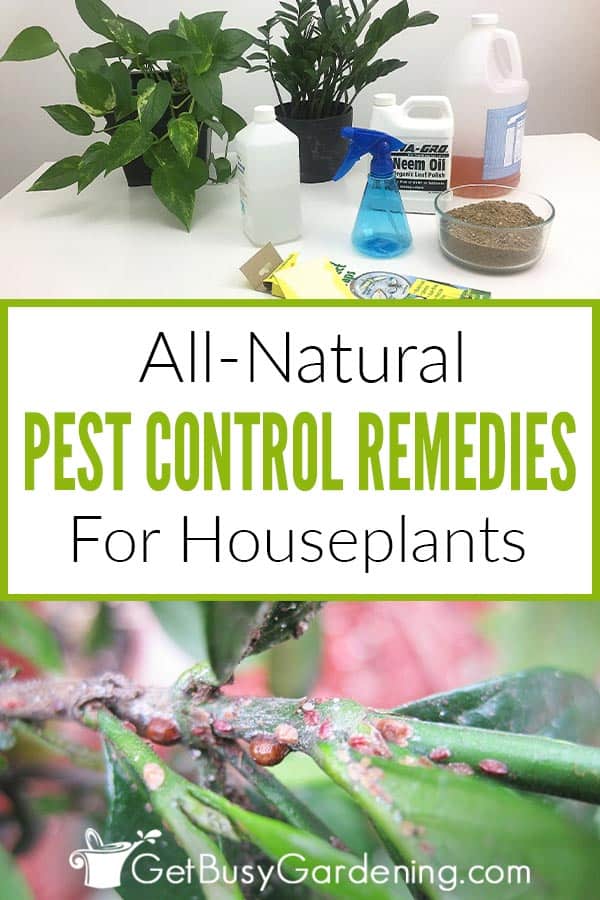
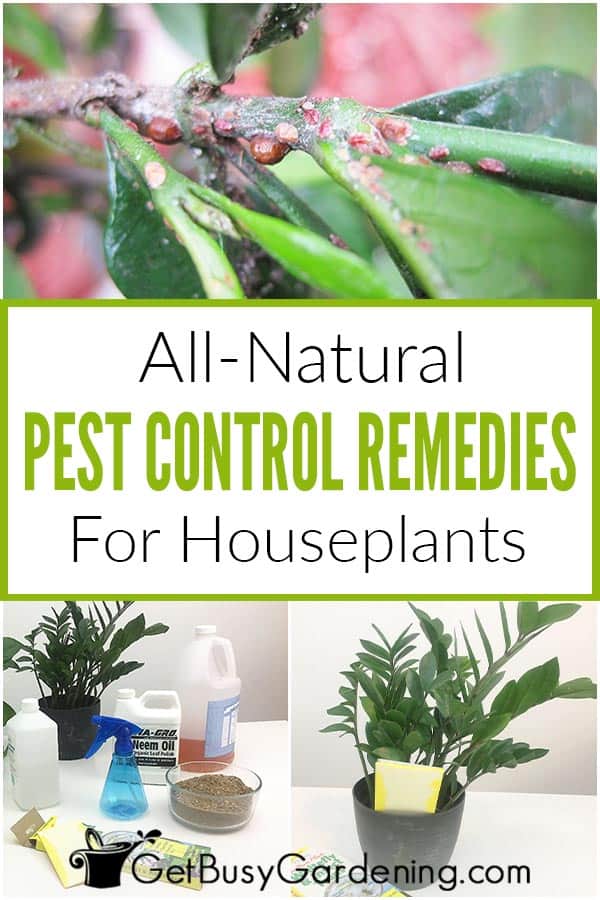
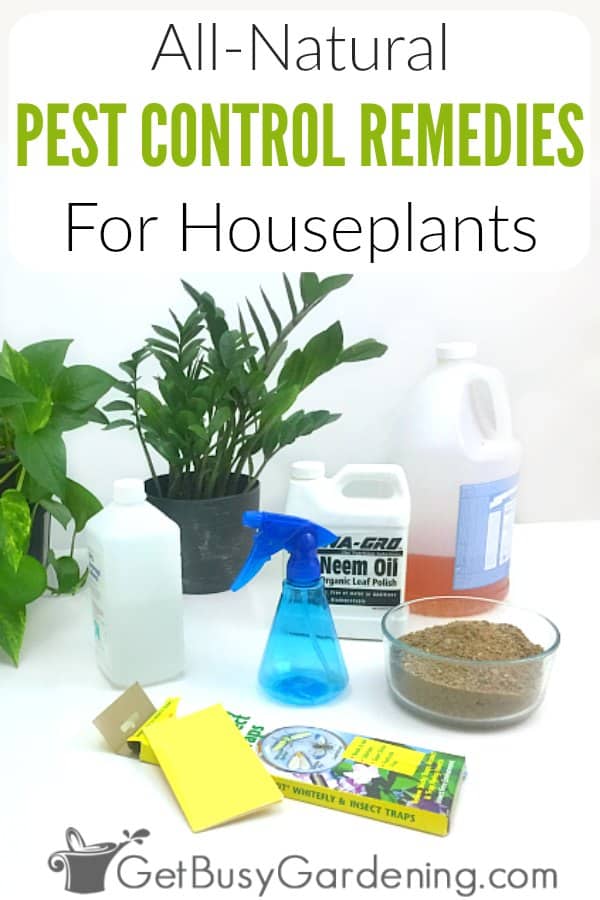
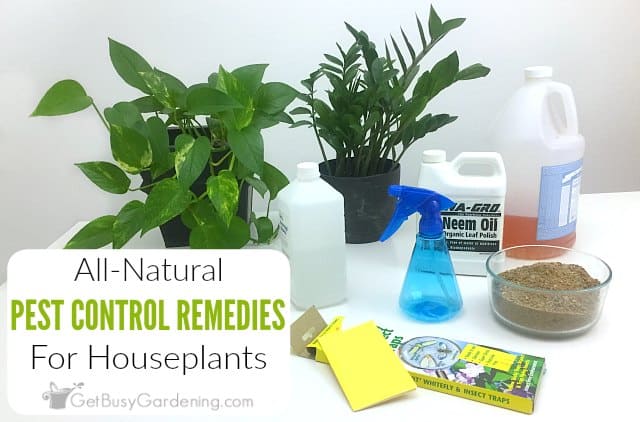

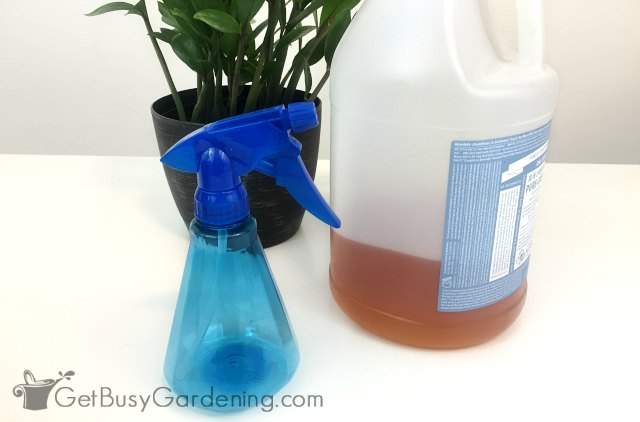
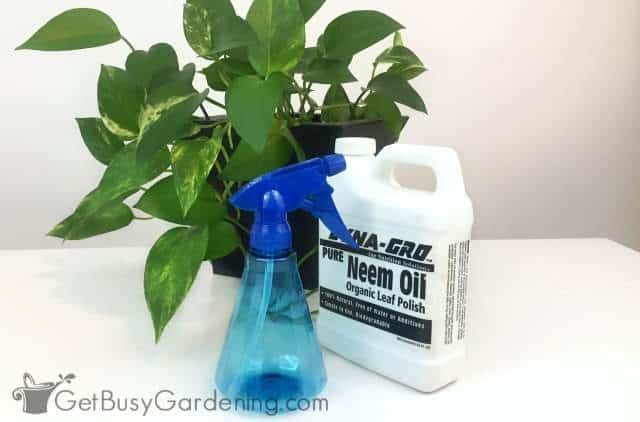
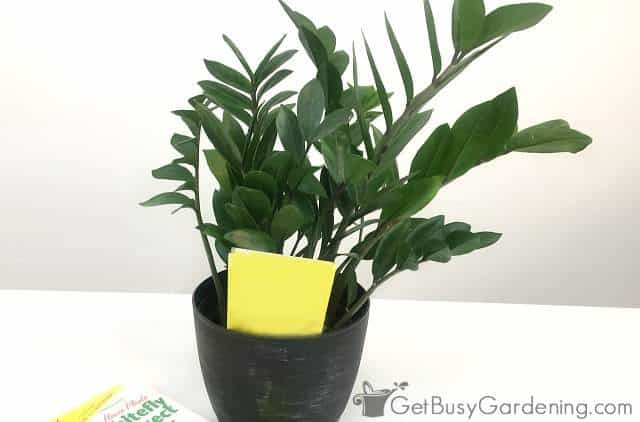
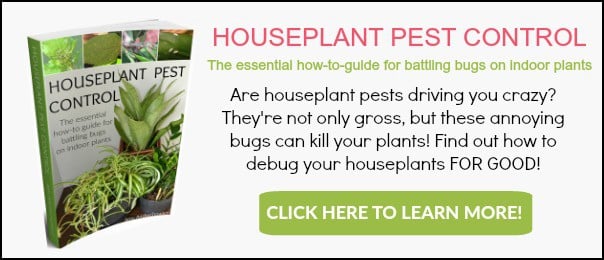

Mariaan says
I have heard that sprinkling Cinnamon over the soil will rid your plant of fungus gnats, which I have done just now before reading your article. They do seem to be dying and disappearing and even a small worm scurried out of the soil. Would you agree on this method or will it end up harming my plant?
Amy Andrychowicz says
It shouldn’t hurt your plant. I have never heard of or tried this method before, so I can’t tell you whether or not it will work – and honestly I’m not sure how/why it would work. But let me know if it’s successful for you. 🙂
Alocasia says
I’m treating an infestation of thrips, mealybug, scale and possibly spider mites with green lacewing larvae.. After all these years I have no idea where this mess came from. Hope they do the trick. My question is do you know offhand if I sprayed with a mix of Dawn liquid dish soap will it kill the lacewing larvae as well?
Amy Andrychowicz says
Yes, unfortunately any type of soap you use to treat the pest insects will also kill the lacewings. The best thing to do is wash all of the bad bugs off the plant first, and then let the lacewings do their thing.
Em Agnew says
I was horrified to find that my Kentia palm had developed mealybugs and have been researching the best and most natural method of treatment. I’ve just applied the mild soap and water mix for the first time and am keeping my fingers crossed. I’m guessing it will take multiple applications, how often would you recommend? Once per day / week? I don’t want to go OTT but also don’t want to go too easy and risk losing my leafy friend!
Amy Andrychowicz says
Oh no, sorry to hear that your houseplant has bugs, that’s no fun. Yes, it will take several treatments to get rid of them, for sure. They are a tough opponent. Treat your plant with the soapy mix at least weekly, though mixing a few different methods usually works the best. I’m not sure what OTT is, but definitely do not give in to the temptation to use synthetic chemical pesticides. They do not work on these types of bugs, are bad for humans and pets, and can only make the problem worse over time. Here are a few blog posts that will help you out, with more details about using all-natural pest control remedies…
How To Get Rid Of Mealybugs On Your Houseplants, For Good!
How To Use Neem Oil Insecticide On Houseplants
Laura says
How can I treat my soil from gnats when I move around the soil in the plant you see these gnats flying around
Amy Andrychowicz says
Here’s a post that will give you detailed tips and instructions… How To Get Rid Of Fungus Gnats In Houseplants Soil.
John Douglas says
I’ve tried everything 2 or three times I’m just so tired of those fungus nats, I’m almost at the point of getting rid of my plants period, it’s just so difficult to kill them and there larvae without harming my plants, there’s always build up of what ever I use that’s harmful to plants
Amy Andrychowicz says
They are super frustrating and difficult to get rid of, I 100% agree! They live and breed in moist soil, so the main key is to make sure you’re not overwatering.
TW says
Would applying unscented hypoallergenic dish soap be a safe soap to use in the neem oil mix?
Amy Andrychowicz says
It sounds like the soap you’re asking about would be mild enough to use. However, I can’t say for sure if I’ve never used it myself. So, I always recommend testing any types of sprays on a few leaves before using them on the whole plant. Let it sit on the test leaves for a week, and if there’s no damage, then it’s safe to use on the whole plant.
Lisa says
I have seen somewhere saying mixing hydrogen peroxide with water and water the soil down once a month can help kill all larvae hiding in the plant soil. Have you heard of it?
Amy Andrychowicz says
I have also heard that before, but I have never tried it myself. There are several people who have left comments on my post about fungus gnats, so you can go there to read the discussions if you’d like to learn more… How To Get Rid Of Fungus Gnats In Houseplants Soil. Just scroll down to the comments section, and search for the word “peroxide” to see all the related comments.
John Douglas says
I’ve tried the poroxide water bath’s several times the thing the two cycles fungus nats last two weeks so how do I not over water them,I really want to sue the store I bought plant soil from that was infested I never even heard of them until maybe a year ago and I’ve been at war with those bugs ever since
Amy Andrychowicz says
If the peroxide isn’t working, then stop using it. I definitely recommend reading my detailed guide on how to get rid of fungus gnats in houseplants. There are TONS of comments from readers sharing their tips and experience too, so be sure to read those.
Aliza says
Would using a soapy water spray on a regular basis (like once or twice a day) be a good preventative measure or would that be overkill? I recently had a bad outbreak of everything (scale, mealybugs, and spidermites) they all just hit at once it seemed and I lost a few of my long time favorite houseplants. I sterilized all my pots via dishwasher, and washed and repotted the ones that were healthy. my goal is to do better prevention before anything starts, this website has been so helpful in dealing with this outbreak and the aftermath.
Amy Andrychowicz says
Oh no, all of those houseplant pests attacked at one! Yikes! That is super frustrating. Spraying the plants with soapy water multiple times a day is definitely overkill. I don’t blame you for wanting to do that though, I have been in your shoes, and I would have done anything to keep the bugs from coming back too!
Have you tried using organic neem oil yet? It does have a residual effect that will help to keep the bugs away. Here’s more info about that… How To Use Neem Oil On Indoor Plants.
But, if you’ve been able to get rid of all the bugs, then I would just monitor the plants very closely for a while, inspecting them daily. After a few months, if you don’t see any signs of bugs, then you should be in the clear.
And I’m so glad to hear you’re finding lots of help on my site, that’s fantastic. So happy to help!
fotomatt says
Can I use the Pure Castile soap to spray my container veggies (tomatoes, peppers, lettuce and herbs)? Thanks from Colorado…
Amy Andrychowicz says
Yes, you can use castile soap to kill pests on veggies, just be sure to dilute it as I mentioned above. I also recommend using one that doesn’t contain any essential oils. I use Dr. Bronners Baby Mild liquid soap. Also, I always recommend testing it on a leaf first to make sure it doesn’t cause any damage before spraying the whole plant. Some plants are more sensitive to sprays than others.
Mar McLerran says
When I looked at the ingredient list for Dr Bonners Baby Mild liquid soap, it lists essential oils but you recommend one that doesn’t contain any essential oils. I have Mrs. Meyers dish soaps with essential oils. Will that be ok?
Amy Andrychowicz says
I’ve never tried that brand myself, so I can’t say for sure. The best you can do is test it on a few leaves to make sure there’s no damage (let it sit for at least a week). If all is good, then it’s safe to treat the whole plant.
Ann Hooper says
Can I use a natural homemade spray for the little. Fruitfly looking bugs around my african violets? They have just started to appear about a week ago. So far there aren’t many but I want to stop the progress now
Amy Andrychowicz says
Yes, those are called fungus gnats and they are very common. They come from the soil, and don’t feed on the leaves. So you’ll need to treat the soil of your African violet plant. Here’s how to get rid of fungus gnats.
Leslie says
None of the bugs listed are what I am having a problem with. Mine are tiny black bugs coming from the soil that are fast and scramble every where when I touch the pot the plant is in. I have treated the soil with the soap mixture when I potted it but it seems to have only gotten rid of the fungus gnats.
Amy Andrychowicz says
Those are baby fungus gnats (the larvae). The adults are the ones that fly. Here’s how to get rid of fungus gnats in houseplants soil.
Hilary says
How do you mix/apply the neem oil?
Amy Andrychowicz says
It depends on the type of neem oil you buy. The neem oil that I recommend above needs to be mixed with a soapy water solution, and I use this organic liquid soap to mix mine. Some other types of neem oil come pre-mixed and don’t need any extra mixing, but be careful because not all of them are organic, and could be mixed with other chemicals. Here’s more information about neem oil and how to use it.